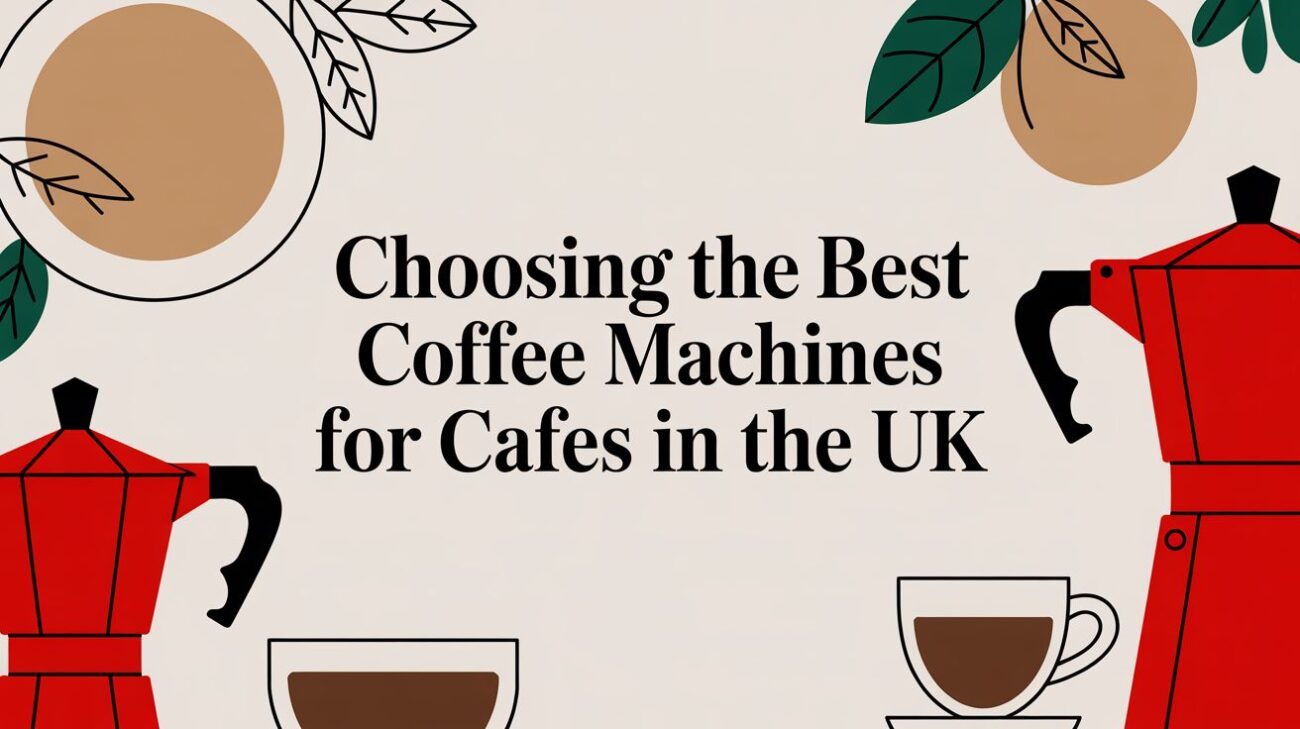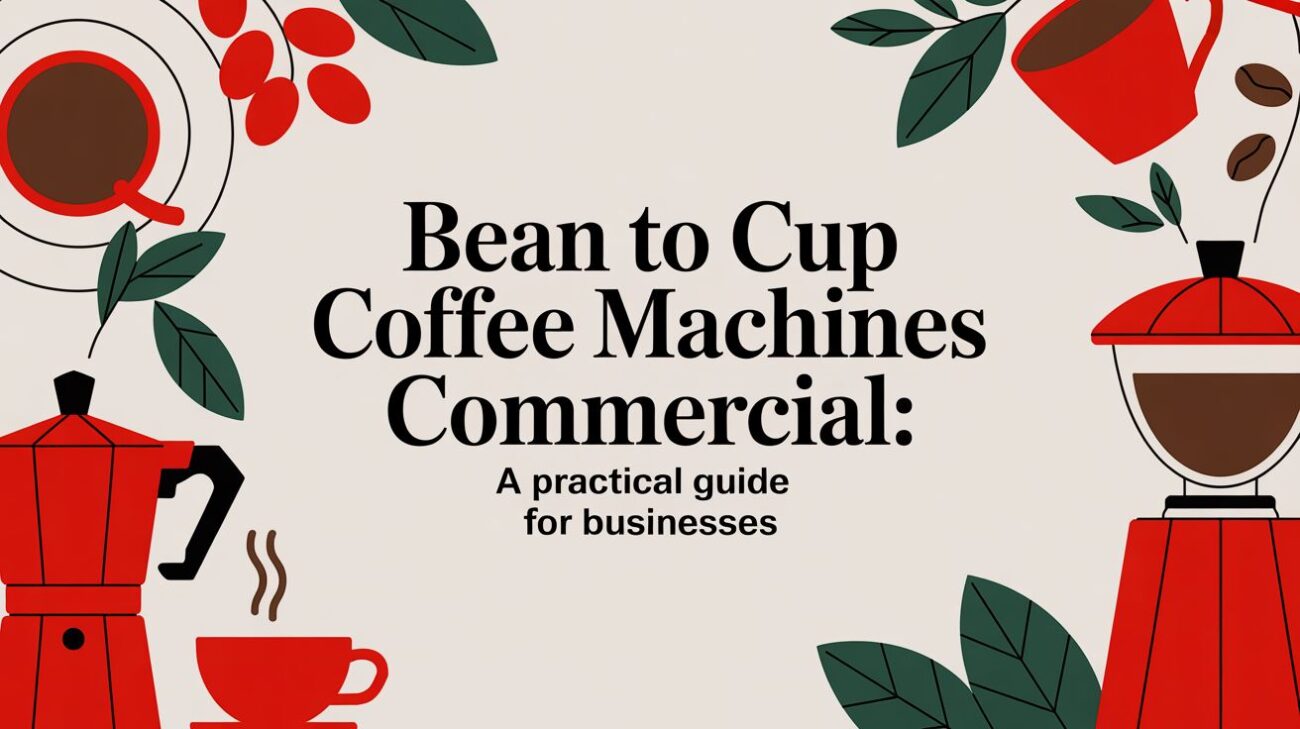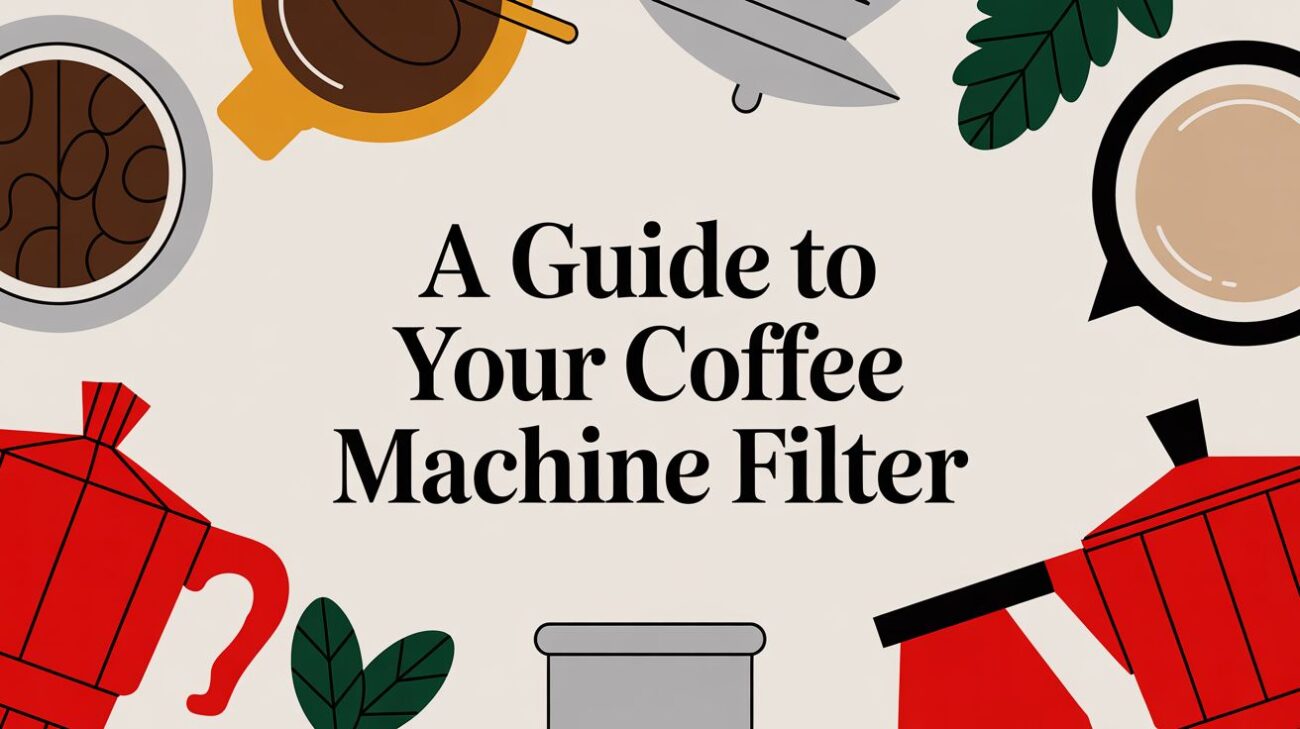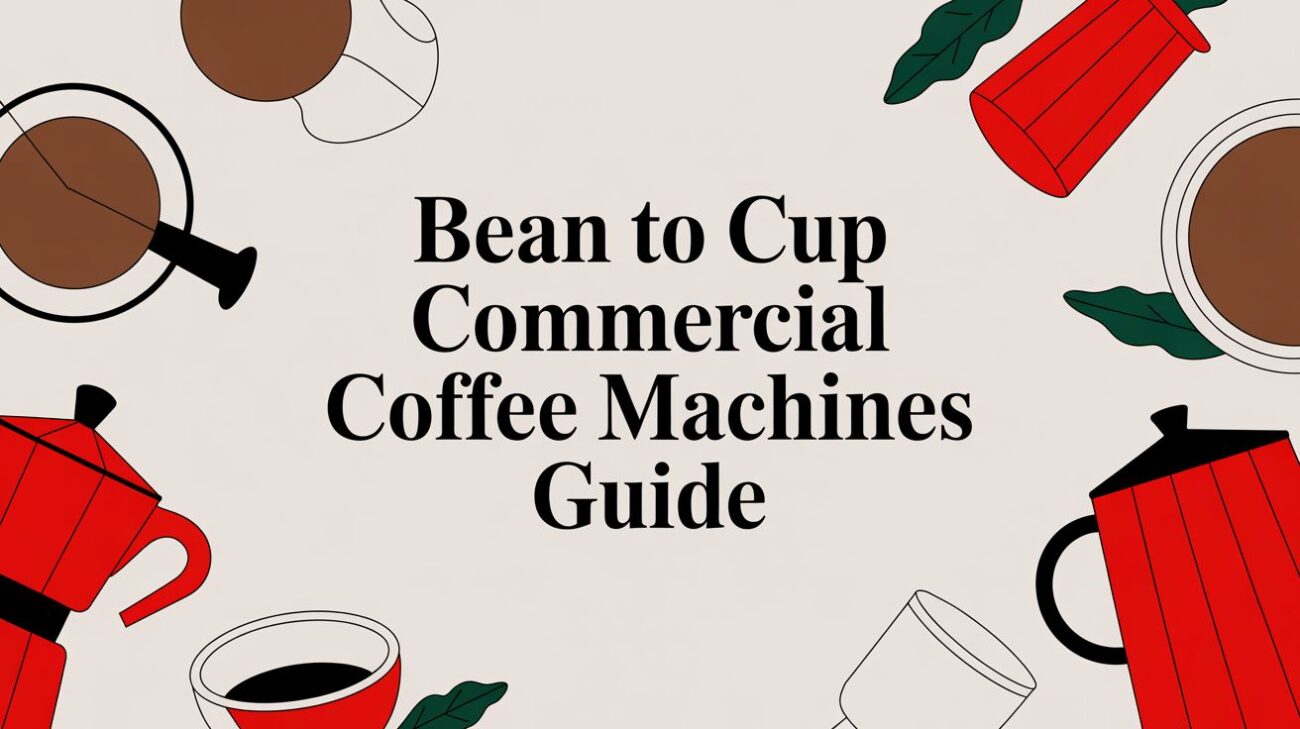Choosing the right commercial coffee machine is one of the most important decisions you'll make for your small coffee shop. It's the engine driving your business, defining your coffee's quality, how quickly you serve customers, and their loyalty. This guide will help you find the best commercial coffee machine for a small coffee shop by balancing performance, features, and budget.
Meta Description: Looking for the best commercial coffee machine for a small coffee shop? Our 2024 guide covers top models, budget options, and key features. Get practical advice for your UK café.
Choosing Your Coffee Shop's Most Important Machine
Your commercial coffee machine is more than just an appliance; it's the heart of your operation. This guide offers practical, real-world advice for UK café owners looking for the perfect fit. We’ll help you navigate the essential factors that will shape your choice.
Think of this as your roadmap. We will cover:
-
Machine Type: From traditional espresso machines for skilled baristas to automated bean-to-cup systems built for speed.
-
Daily Drink Volume: Matching the machine’s capacity to your expected customer numbers is crucial for smooth service.
-
Your Budget: We'll explore buying new, refurbished, or leasing your equipment.
Making an informed decision is vital. As you weigh your options, reading guides on the best commercial espresso machines can provide valuable context. It’s all about selecting equipment that brews amazing coffee and supports your shop’s growth. Our guide on how to choose a commercial coffee machine by footfall and menu offers more detailed insights.
What type of commercial coffee machine is best for a small coffee shop?
Choosing the right type of commercial coffee machine is the first big step. Your choices boil down to two main camps: traditional espresso machines, which offer full manual control, and super-automatic (bean-to-cup) machines, built for speed and consistency.
Think of it like choosing a car. A traditional machine is like a manual gearbox; it puts a skilled barista in total control. A bean-to-cup machine is like an automatic, delivering a reliable, consistent result every time with minimal effort.
Commercial Coffee Machine Type Comparison
To make sense of the options, it helps to see them side-by-side. This table breaks down the key differences in control, consistency, speed, and the skill level your staff will need for each type.
| Machine Type | Best For | Staff Skill Required | Consistency | Speed |
|---|---|---|---|---|
| Traditional Semi-Automatic | Artisan coffee shops prioritising craft, quality, and the 'theatre' of coffee making. | High – requires skilled, trained baristas. | Variable – depends entirely on barista skill. | Slower – best for considered, crafted drinks. |
| Super-Automatic (Bean-to-Cup) | Businesses needing speed and consistency (e.g., delis, offices, high-turnover sites). | Low – minimal training needed. | High – produces the same result every time. | Fast – ideal for handling high volume and queues. |
| Bulk Brew / Filter | Shops with a morning rush for black coffee; complements an espresso machine. | Very Low – simple to set up and serve. | High – consistent batch brewing. | Very Fast – serves multiple customers instantly. |
Your decision depends on the kind of service you want to offer. Are you all about craft, or is efficiency your number one priority?
Traditional Semi-Automatic Espresso Machines
A traditional espresso machine is the centrepiece of any artisan coffee shop. These machines demand a skilled barista to grind, dose, tamp, and pull the shot, giving them complete command over the final flavour. This hands-on process is perfect for shops that make the craft of coffee-making a core part of the customer experience.
The demand for high-quality, handcrafted coffee has boomed in the UK. According to research, the UK's branded coffee shop market is forecast to reach a massive £6.1 billion by 2025. This shows a huge opportunity for small businesses with the right equipment.
Key benefits include:
-
Unmatched Quality Control: A skilled barista can tweak variables like grind size or extraction time to pull exceptional espresso shots.
-
The Customer Experience: The sight and sound of a barista expertly crafting a drink is a huge draw for customers.
-
Built to Last: These machines are workhorses, often lasting for decades with proper care, making them a solid long-term investment.
The trade-off is that they demand significant staff training, and service can be slower during busy periods compared to automated machines.
Super-Automatic Bean-to-Cup Machines
Super-automatic, or bean-to-cup, machines are engineered for efficiency. With one press of a button, they grind fresh beans, tamp the coffee, and pour a perfect espresso. Most will even steam and froth milk automatically. This makes them a brilliant choice for businesses with high staff turnover or where speed is the name of the game.
This diagram helps visualise how the core decisions you face—machine type, volume, and budget—all connect.
As you can see, these factors are all connected; your budget will guide the type of machine and the volume capacity you can realistically go for.
A bean-to-cup machine is your secret weapon for consistency. Every coffee, from the first of the day to the last, will taste exactly the same. That’s crucial for building customer trust.
These machines are spot-on for cafés or delis where coffee is a vital part of the menu but not the sole focus. For a deeper dive, read our guide on bean-to-cup vs traditional espresso machines.
Bulk Brew and Filter Coffee Machines
Don't forget the humble filter brewer. For a small shop that gets slammed with a morning rush for black coffee, a bulk brewer is an incredibly smart tool. It can produce several litres of fantastic filter coffee at once, freeing up your espresso machine for more complex drinks. It's a cost-effective way to get through queues and keep customers happy.
Figuring Out Your Cafe's Required Machine Capacity
Picking a new coffee machine is like choosing an engine for a delivery van. Go too small, and you’ll struggle during the morning rush. Go too big, and you’ve sunk cash into horsepower you’ll never use. Finding the best commercial coffee machine for your small coffee shop is about hitting that sweet spot between performance and price.
The trick is to get a realistic handle on your potential drink output, especially during your busiest spells. Get this right, and you’ll avoid bottlenecks and keep queues moving.
Estimating Your Peak and Daily Volume
First, think about your absolute busiest hour. For most coffee shops, this is the morning commute. A solid estimate for a small but popular spot would be 40-60 drinks during that peak hour.
With that peak number, you can work out your total daily output. A good rule of thumb is to multiply your peak hour figure by your opening hours, then take about 30-40% of that total. So, if you plan for 50 drinks in your busiest hour and you're open for 10 hours, you're looking at a daily total of around 150-200 drinks.
Think about your location's footfall and nearby businesses. It’s smart to be a little conservative, but underestimating could mean you outgrow your machine in six months.
Many of our commercial coffee machines come with guidance on their ideal daily output, which makes matching a model to your needs much easier.
Understanding Groupheads and Boiler Capacity
When you browse traditional espresso machines, you'll see them described by the number of 'groupheads'. A grouphead is where your barista locks in the portafilter (the handle with the coffee grounds) to pull a shot.
-
1-Group Machine: Best for very low-volume sites or as a secondary machine for decaf.
-
2-Group Machine: The industry standard for most small to medium coffee shops, allowing one barista to work efficiently.
-
3-Group Machine: Built for high-volume cafés and almost certainly overkill for a small coffee shop.
For nearly every small café owner, a 2-group machine is the perfect middle ground. It gives you the power to handle the busiest periods without the hefty price tag of a bigger unit.
Demystifying Boiler Size and Recovery Time
The final piece of this puzzle is the boiler. It supplies hot water for brewing and steam for frothing milk. A small boiler will struggle to keep up during a rush, causing steam pressure to drop and slowing everything down. This is where boiler recovery time comes in—how fast the machine gets back to temperature.
A quality machine with a decent-sized boiler (look for 10 litres or more on a 2-group model) will maintain constant, stable pressure. It’s the difference between smooth service and frustrating delays.
Budgeting for Your Coffee Machine: New, Refurbished, or Leased?
Figuring out your budget is a huge step. Finding the best commercial coffee machine for a small coffee shop is about understanding the total cost of ownership. This means weighing up the pros and cons of buying new, choosing a refurbished model, or leasing your equipment.
Each route has its own advantages. A new machine offers the latest tech and a full warranty. A refurbished machine can deliver similar performance for a fraction of the cost. Leasing protects your capital by turning a massive expense into manageable monthly payments.
Buying a New Commercial Coffee Machine
Purchasing a new machine outright is the most direct route. You own the asset from day one and it’s covered by a full warranty. This is a brilliant choice if you have the capital ready and want the security of a factory-fresh unit.
The initial outlay for a quality 2-group espresso machine can be anywhere from £4,000 to over £10,000. While significant, it's a one-time cost, and the machine becomes a valuable asset.
The Smart Economics of Refurbished Machines
A professionally refurbished coffee machine can be a game-changer. These aren't just "second-hand" units; they are machines that have been stripped down, serviced, and rebuilt by expert engineers. You get a reliable, high-performance machine for a much lower cost, often saving 30-50% compared to new.
Choosing a refurbished model from a trusted supplier like ADS Coffee Supplies means you're getting a machine that's been rigorously tested and is backed by a warranty. It’s a fantastic way to get premium equipment without draining your startup budget.
Leasing Your Way to Success
Leasing is a financially flexible way for a small coffee shop to get started. Instead of a huge upfront payment, you pay a fixed monthly fee over a set term.
-
Preserves Cash Flow: It keeps your capital free for other essential startup costs.
-
Includes Maintenance: Many leasing deals include regular servicing and breakdown cover.
-
Tax Efficiency: Lease payments are typically 100% tax-deductible as an operating expense.
-
Easy Upgrades: At the end of the term, you can often upgrade to a newer model.
Exploring various commercial kitchen equipment leasing options can offer valuable insights. The UK coffee shop market is booming, and smart financing is key. For a deep dive, check out our guide on coffee machine leasing vs buying.
The Best Commercial Coffee Machines for Small Coffee Shops
It’s time to look at some of the best commercial coffee machines on the market for a small shop. This list is based on performance, reliability, and value for money to help you find the perfect partner for your business. I’ve chosen models that cater to different setups and budgets.
Our Top-Rated Machines for Small Coffee Shops
Let's dive into what makes each of these machines tick and which type of small coffee shop would get the most out of their features.
1. ADS Premium Choice: La Spaziale S2 EK 2 Group
- Best For: The ambitious artisan coffee shop that needs a premium, reliable workhorse.
This machine is our number-one pick for a reason. The La Spaziale S2 is a powerhouse of consistency and reliability. It features a unique steam-based heat exchange system that guarantees exceptional temperature stability for every shot. For a small shop obsessed with quality, this is a game-changer.
Its dual groupheads and programmable controls mean your baristas can fly through the busiest morning rush. It's also built like a tank, making it a fantastic long-term investment.
2. The Artisan's Dream: The Bezzera Unica PID
- Best For: A compact café or mobile setup where space is tight but quality is non-negotiable.
For shops with a smaller footprint, a powerful single-group machine can be the perfect fit. The Bezzera Unica PID packs professional-grade features into a compact design. Its PID temperature control gives baristas precise command over the brewing temperature.
This level of control allows you to fine-tune your espresso extraction, bringing out the best in your speciality coffee beans. It's a superb choice for a business that wants to make its name on exceptional, hand-crafted coffee.
3. The Speed & Efficiency Champion: The Jura Giga X8
- Best For: High-turnover spots like delis or bakeries where speed and ease of use are everything.
When you need to serve great coffee quickly with minimal staff training, a super-automatic machine like the Jura Giga X8 is unbeatable. This machine is a marvel of Swiss engineering, capable of producing two speciality coffees at once, all at the touch of a button.
It features dual ceramic grinders and an intuitive touchscreen. It's the best commercial coffee machine for a small coffee shop that puts workflow efficiency and consistent quality first, without needing a trained barista on shift.
What About Capsule and Pod Systems?
Pod machines offer incredible consistency and are ridiculously easy to use. While not for every café, they can be a sensible choice for businesses like hotels or B&Bs where coffee is an important secondary offering.
Recent data from sources like UK coffee market trends from Lumina Intelligence show that convenience and consistency are increasingly important factors for many businesses.
Key Takeaway: They aren't for every café, but pod systems offer incredible consistency and are easy to use, making them a sensible choice for businesses where coffee is an important secondary offering.
Making Your Final Decision
Each of these machines is a fantastic choice, but the right one for you depends on your business model.
-
If your brand is built on the art of coffee, the control of the La Spaziale or Bezzera is what you need.
-
If your success hinges on speed and simplicity, the Jura Giga X8 is the perfect automated partner.
Think about your staff, your menu, and the experience you want to create for your customers.
Planning for Installation and Long-Term Maintenance
Choosing the right machine is a huge milestone, but planning for installation and maintenance is essential to protect your investment. A well-cared-for machine performs better and lasts longer.
Before your equipment arrives, you need to prepare its new home. Getting these practical details sorted in advance will ensure the installation is smooth.
Preparing Your Space for Installation
A commercial coffee machine has specific needs. You’ll need to work with your plumber and electrician to ensure your counter is ready.
Here's a quick checklist:
-
Power Supply: Most machines require a dedicated, higher-amperage electrical circuit.
-
Water Access: Your machine needs to be plumbed into the mains with an isolation valve nearby.
-
Water Filtration: UK water varies in hardness, and a professional water filtration system is non-negotiable to prevent limescale damage.
-
Drainage: The machine’s drip tray needs to connect to a drain.
-
Space and Ventilation: Ensure enough room around the machine for airflow and for your baristas to work comfortably.
Creating a Simple Maintenance Routine
Consistent cleaning is the secret to a long life for your coffee machine. A simple daily, weekly, and monthly routine will keep it running perfectly.
Think of your maintenance routine as insurance. Just five to ten minutes of cleaning at the end of each day can prevent costly repairs and keep you serving fantastic coffee.
Daily tasks should include backflushing the groupheads, cleaning the steam wands, and wiping down all surfaces. Weekly, you should soak portafilters and baskets. Partnering with a supplier who offers a comprehensive service and support package is the best approach.
Frequently Asked Questions
Picking your first commercial coffee machine is a huge decision. Here are some of the most common questions we hear from new coffee shop owners.
How many groupheads do I really need?
For most small coffee shops, a 2-group machine is the sweet spot. This setup lets a single barista comfortably handle two drinks at once, keeping the queue moving during a morning rush. A 1-group machine can quickly get swamped, while a 3-group machine is usually overkill.
Is a bean-to-cup machine a good idea for a new café?
It can be, but it depends on your brand. A bean-to-cup machine is a brilliant choice if your business is built on speed, consistency, and simplicity. They are perfect for delis, bakeries, or takeaways. However, if your brand is about artisanal coffee, a traditional espresso machine is the only way to go.
The Bottom Line: Your machine has to match your brand. Are you selling quick convenience, or the art of expertly crafted coffee? Once you answer that, you’ll know which type of machine is right for you.
What's the single most important accessory to buy?
Without a doubt, a high-quality commercial grinder. It's non-negotiable. Your machine is only ever as good as the ground coffee you feed it. A cheap grinder with an inconsistent grind will produce a terrible-tasting espresso, no matter how fancy your machine is. A reliable grinder and a professional water filtration system are the two most crucial investments after the machine itself. For more advice, some blogs offer great insights on choosing the best coffee machine for Americano and other drinks.
Ready to find the perfect coffee machine to launch or grow your business? The expert team at ADS Coffee Supplies is here to help with personalised advice, leasing options, and professional installation.






